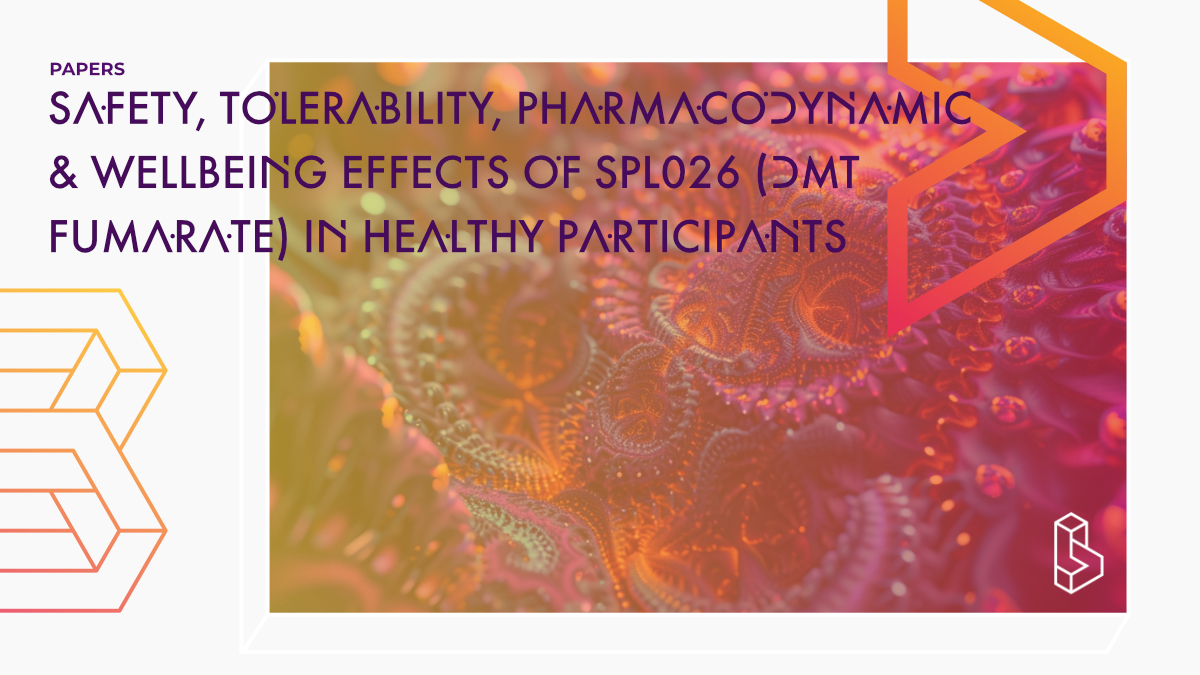This Phase I study (n=44) investigates the safety, tolerability, pharmacokinetics, and -dynamic profile of escalating doses of SPL026 (DMT fumarate; 9-21.5mg) in psychedelic-naïve healthy participants. The RCT concludes that SPL026 was well-tolerated, showing an acceptable safety profile, with potential correlations between plasma concentration and psychometric measures.
Abstract of Safety, tolerability, pharmacodynamic and wellbeing effects of SPL026 (dimethyltryptamine fumarate) in healthy participants: a randomized, placebo-controlled phase 1 trial
“Background: Due to their potential impact on mood and wellbeing there has been increasing interest in the potential of serotonergic psychedelics such as N,N-dimethyltryptamine (DMT) in the treatment of major depressive disorder (MDD).
Aim: The aim of Part A of this study was to evaluate the safety, tolerability, pharmacokinetics (PK) and pharmacodynamic (PD) profile of escalating doses of SPL026 (DMT fumarate) in psychedelic-naïve healthy participants to determine a dose for administration to patients with MDD in the subsequent Phase 2a part of the trial (Part B: not presented in this manuscript).
Methods: In the Phase 1, randomized, double-blind, placebo-controlled, parallel-group, single dose-escalation trial, psychedelic-naïve participants were randomized to placebo (n = 8) or four different escalating doses [9, 12, 17 and 21.5 mg intravenously (IV)] of SPL026 (n = 6 for each dose) together with psychological support from 2 therapy team members. PK and acute (immediately following dosing experience) psychometric measures [including mystical experience questionnaire (MEQ), ego dissolution inventory (EDI), and intensity rating visual analogue scale (IRVAS)] were determined. Additional endpoints were measured as longer-term change from baseline to days 8, 15, 30 and 90. These measures included the Warwick and Edinburgh mental wellbeing scale and Spielberger’s state-trait anxiety inventory.
Results: SPL026 was well tolerated, with an acceptable safety profile, with no serious adverse events. There was some evidence of a correlation between maximum plasma concentration and increased IRVAS, MEQ, and EDI scores. These trends are likely to require confirmation in a larger sample size. Using the analysis of the safety, tolerability, PD, PK results, doses of 21.5 mg SPL026 were the most likely to provide an intense, tolerated experience.
Conclusion: Based on the data obtained from this part of the trial, a dose of 21.5 mg SPL026 given as a 2-phase IV infusion over 10 min (6 mg/5 min and 15.5 mg/5 min) was selected as the dose to be taken into patients in Part B (to be presented in a future manuscript).”
Authors: Ellen James, David Erritzoe, Tiffanie Benway, Zelah Joel, Christopher Timmermann, Meghan Good, Claudio Agnorelli, Brandon M. Weiss, Tommaso Barba, Graham Campbell, Michelle Baker Jones, Charlotte Hughes, Helen Topping, Malcolm Boyce & Carol Routledge
Summary of Safety, tolerability, pharmacodynamic and wellbeing effects of SPL026 (dimethyltryptamine fumarate) in healthy participants: a randomized, placebo-controlled phase 1 trial
Introduction
Psychedelic drugs such as DMT have been consumed by indigenous peoples in South America for thousands of years, and have been studied in healthy volunteers where they produce a range of psychedelic effects such as those on perceptions, emotion, mood alterations and anxiety.
The serotonergic system is implicated in the pathogenesis of major depressive disorder, and DMT acts via modulation of the serotonergic system, particularly the 5HT2A receptor.
Find this paper
https://doi.org/10.3389/fpsyt.2023.1305796
Open Access | Google Scholar | Backup | 🕊
Cite this paper (APA)
James, E., Erritzoe, D., Benway, T., Joel, Z., Timmermann, C., Good, M., ... & Routledge, C. (2023). Safety, tolerability, pharmacodynamic and wellbeing effects of SPL026 (dimethyltryptamine fumarate) in healthy participants: a randomized, placebo-controlled phase 1 trial. Frontiers in Psychiatry, 14.
Compound Details
The psychedelics given at which dose and how many times
DMT 9 - 21.5mg | 1x
Linked Research Papers
Notable research papers that build on or are influenced by this paper
Pharmacokinetics of N,N-dimethyltryptamine in HumansThis double-blind, placebo-controlled study (n=24) evaluated the metabolism and clinical pharmacokinetics (how the body processes drugs) of DMT (SPL026) in an ongoing Phase I study with healthy subjects by Small Pharma. Participants received escalating doses of SPL026 via a 2-phase intravenous (IV) infusion. SP206 was safe and well-tolerated, and dose-proportional increases in DMT exposure were observed over 9–21.5 mg. For all doses, the median time to peak plasma concentration was ~10 min, and the mean elimination half-life was 9–12 min.
Linked Clinical Trial
SPL026 (DMT Fumarate) in Healthy Subjects and MDD PatientsSPL026 (N,N-dimethyltryptamine [DMT] fumarate) is a psychedelic tryptamine being developed as a therapy for patients with major depressive disorder (MDD).

